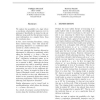Free Online Productivity Tools
i2Speak
i2Symbol
i2OCR
iTex2Img
iWeb2Print
iWeb2Shot
i2Type
iPdf2Split
iPdf2Merge
i2Bopomofo
i2Arabic
i2Style
i2Image
i2PDF
iLatex2Rtf
Sci2ools
121
click to vote
KR
2000
Springer
2000
Springer
Significant Inferences : Preliminary Report
We explore the possibility of a logic where a conclusion substantially improves over its premise(s): Specifically, we intend to rule out inference steps such that the premise conveys more information, in a simpler form, than the conclusion does. In fact, most reasoning formalisms, among them classical logic, come with means for generating disjunctive or conditional information in a fairly arbitrary way. The basic principle for drawing disjunctive information is disjunctive weakening, which allows for deriving from (for any ). Thus, given that "Nancy is married to Ron", disjunctive weakening makes us infer that "Nancy is married to Ron or Monica is married to Bill". Although the latter propositions may still be seemingly related, one should not forget (1) that any arbitrary proposition can serve as the additional disjunct, eg. "Nancy is married to Ron or the Queen of England is bald", and (2) that this can be iterated so that real information is buried...
Automated Reasoning | Disjunctive Information | Disjunctive Weakening | KR 2000 | Relevance Logics |
Related Content
| Added | 25 Aug 2010 |
| Updated | 25 Aug 2010 |
| Type | Conference |
| Year | 2000 |
| Where | KR |
| Authors | Philippe Besnard, Torsten Schaub |
Comments (0)

